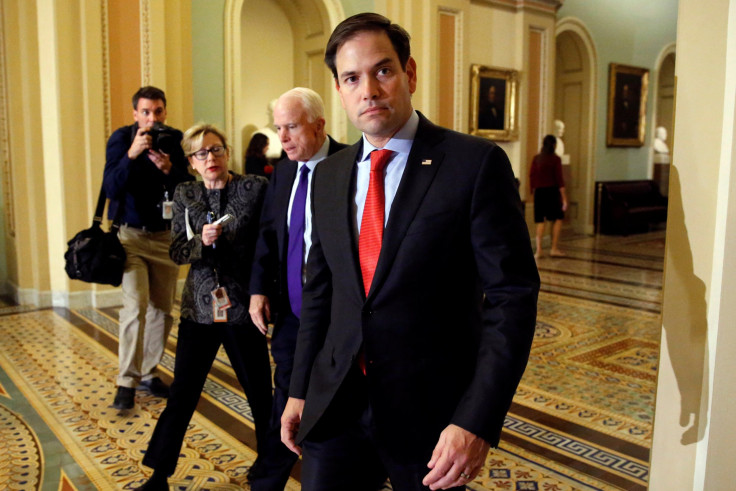How Should US React To Castro Death? Sen. Marco Rubio Says Roll Back Concessions

Sen. Marco Rubio, R-Fla., said Sunday the death of Cuba’s Fidel Castro changes nothing on the island, and President-elect Donald Trump should roll back concessions made by the Obama administration.
Fidel Castro, 90, died Friday after several years of ill-health. His brother, Raul, 85, succeeded him as president in 2013 and plans to retire in February 2018.
Rubio said on NBC’s “Meet the Press” said he is convinced the issue is among Trump’s top priorities.
"All of the concessions that Barack Obama has granted the Castro regime were done through executive order, which means the next president can reverse them," Trump said in September at a really in Miami. "And that, I will do, unless the Castro regime meets our demands — not my demands, our demands."
Rubio, who is of Cuban descent, said the goal should not be to punish the island but to “help create an environment where we are creating the potential for a transition to democratic order in Cuba at some point in the near future.”
Rubio had harsh words for Castro in a statement released Saturday.
“Over six decades, millions of Cubans were forced to flee their own country, and those accused of opposing the regime were routinely jailed and even killed,” Rubio said. “Sadly, Fidel Castro's death does not mean freedom for the Cuban people or justice for the democratic activists, religious leaders, and political opponents he and his brother have jailed and persecuted. The dictator has died, but the dictatorship has not.”
History will remember Fidel Castro as an evil, murderous dictator who inflicted misery & suffering on his own people pic.twitter.com/Y7207S6qVD
— Marco Rubio (@marcorubio) November 26, 2016
Sen. Ted Cruz, R-Texas, recounted his family’s hardships in Cuba on ABC’s “This Week,” saying his father and aunt were jailed and tortured by the Batista regime, which was overthrown by Castro, before fleeing to the United States in the 1950s.
Cruz called on top administration officials to skip Castro’s funeral, citing continued human rights violations.
“Let’s stand with human rights and let’s not celebrate someone who has 60 years of blood on his hands,” Cruz said.
"This ought to be a moment where Cubans are dancing in the street because they’re being liberated, but instead, listen, if you dance in the street, you’re going to be thrown in jail. Cuba is not a free society.”
A dictator is dead. But his dark, repressive legacy will not automatically follow him to the grave https://t.co/fNjWVnqzsv
— Ted Cruz (@tedcruz) November 27, 2016
Cuban immigration to the United States increased markedly once ties between the U.S. and Cuba were renewed in 2014, Pew Research Center reported. In the first 10 months of this year, 46,635 Cubans entered the United States at ports of entry where they merely have to show up and pass a criminal history check. Last year, 43,159 immigrated, up 78 percent from 2014 when 24,278 Cubans entered the United States.
© Copyright IBTimes 2025. All rights reserved.






















